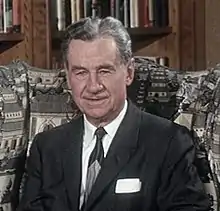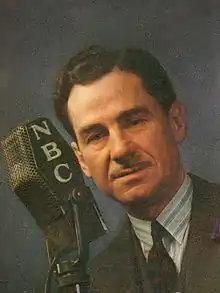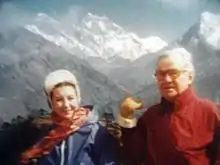Lowell Thomas
Lowell Jackson Thomas (April 6, 1892 – August 29, 1981) was an American writer, broadcaster, and traveler, best remembered for publicising T. E. Lawrence (Lawrence of Arabia). He was also involved in promoting the Cinerama widescreen system.[1] In 1954, he led a group of New York City-based investors to buy majority control of Hudson Valley Broadcasting, which, in 1957, became Capital Cities Television Corporation.
Lowell Thomas | |
|---|---|
 Lowell Thomas, c. 1966 | |
| Born | Lowell Jackson Thomas April 6, 1892 Woodington, Ohio, U.S. |
| Died | August 29, 1981 (aged 89) Pawling, New York, U.S. |
| Alma mater | Valparaiso University University of Denver Princeton University |
| Occupation(s) | Writer, broadcaster |
| Employer | Chicago-Kent College of Law |
| Spouses | Frances Ryan
(m. 1917; died 1975)Marianna Munn
(m. 1977) |
| Children | Lowell Thomas Jr. |
Early life
Thomas was born in Woodington, Ohio, to Harry and Harriet (née Wagoner) Thomas. His father was a doctor, his mother a teacher. In 1900, the family moved to the mining town of Victor, Colorado. Thomas worked there as a gold miner, a cook, and a reporter on the newspaper.[2]

In 1911, Thomas graduated from Victor High School where one of his teachers was Mabel Barbee Lee.[3] The following year, he graduated from Valparaiso University with a bachelor of science degree. The next year, he received both a B.A. and an M.A. from the University of Denver[4][5] and began work for the Chicago Journal, writing for it until 1914. Thomas also was on the faculty of Chicago-Kent College of Law[6] (now part of Illinois Institute of Technology), where he taught oratory from 1912 to 1914. He then went to New Jersey where he studied for a master's at Princeton University (he received the degree in 1916) and again taught oratory at the university.
Career
Thomas was a relentless self-promoter, and he persuaded railroads to give him free passage in exchange for articles extolling rail travel. When he visited Alaska, he hit upon the idea of the travelogue, movies about faraway places. When the United States entered World War I, President Wilson sent him and others to "compile a history of the conflict", but the mission was not academic. The war was not popular in the United States, and Thomas was sent to find material that would encourage the American people to support it. He did not want to merely write about the war, he wanted to film it.
Lawrence of Arabia

Thomas and cameraman Harry Chase first went to the Western Front, but the trenches had little to inspire the American public. They then went to Italy, where he heard of General Allenby's campaign against the Ottoman Empire in Palestine. Thomas traveled to Palestine as an accredited war correspondent with the permission of the British Foreign Office. In Jerusalem, he met T. E. Lawrence, a captain in the British Army stationed in Jerusalem. Lawrence was spending £200,000 a month encouraging the inhabitants of Palestine to rebel against the Turks. Thomas and Chase spent several weeks with him in the desert, although Lawrence had told them that it would be "several days". Lawrence agreed to provide Thomas with material on the condition that Thomas also photograph and interview Arab leaders such as Emir Feisal.
Thomas shot dramatic footage of Lawrence, then returned to America and began giving public lectures in 1919 on the war in Palestine, "supported by moving pictures of veiled women, Arabs in their picturesque robes, camels and dashing Bedouin cavalry." His lectures were very popular and audiences large, and he "took the nation by storm" in the words of one modern biographer. He agreed to take the lecture to Britain, but only "if asked by the King and given Drury Lane or Covent Garden" as a lecture venue. His conditions were met, and he opened a series at Covent Garden on August 14, 1919. "And so followed a series of some hundreds of lecture–film shows, attended by the highest in the land".[7]
At the opening of his six-month London run, there were incense braziers, exotically dressed women dancing before images of the Pyramids, and the band of the Welsh Guards playing accompaniment. Lawrence saw the show several times. He later claimed to dislike it, but it generated valuable publicity for his book. To strengthen the emphasis on Lawrence in the show, Thomas needed more photographs of him than Chase had taken in 1918. Lawrence claimed to be wary of publicity, but he agreed to a series of posed portraits in Arab dress in London.
Thomas genuinely admired Lawrence and continued to defend him against attacks on his reputation.[8] Lawrence's brother Arnold allowed Thomas to contribute to T.E. Lawrence by his Friends (1937), a collection of essays and reminiscences published after Lawrence's death.[9]
.jpg.webp)
Narration and Cinerama
Thomas was a magazine editor during the 1920s, but he never lost his fascination with the movies. He narrated Twentieth Century Fox's twice weekly Movietone newsreels until 1952, and provided the voice-over for numerous short subject film series, including Lowell Thomas' Magic Carpet of Movietone and Going Places with Lowell Thomas. [10]

Thomas went into business with Mike Todd and Merian C. Cooper to exploit Cinerama, a film exhibition format using three projectors and an enormous curved screen with seven-channel surround sound. He produced the documentaries This is Cinerama, Seven Wonders of the World, and Search for Paradise in this format in 1956, with a 1957 release date.[11]
Radio commentator and newscaster
Thomas was first heard on radio delivering talks about his travels in 1929 and 1930: for example, he spoke on the NBC Radio Network in late July 1930 about his trip to Cuba.[12] Then, in late September 1930, he took over as the host of the Sunday evening Literary Digest program, replacing the previous host, Floyd Gibbons.[13]
On this program, he told stories of his travels. The show was fifteen-minutes long, and heard on the NBC Network.[14] Thomas soon changed the focus of the program from his own travels to interesting stories about other people, and by early October 1930, he was also including more news stories. It was that point that the program, which was now on six days a week, moved to the CBS Radio network.[15]
After two years, he switched back to the NBC Radio network but returned to CBS in 1947. He was not an employee of either NBC or CBS, contrary to today's practices, but was employed by the broadcast's sponsor Sunoco. He returned to CBS to take advantage of lower capital-gains tax rates, establishing an independent company to produce the broadcast which he sold to CBS. He hosted the first television news broadcast in 1939 and the first regularly scheduled television news broadcast beginning on February 21, 1940, over W2XBS (now WNBC) New York, which was a camera simulcast of his radio broadcast.[16]

In the summer of 1940, Thomas anchored a television broadcast of the 1940 Republican National Convention, the first live telecast of a political convention, which was fed from Philadelphia to W2XBS and on to W2XB. He was not actually in Philadelphia but was anchoring the broadcast from a New York studio and merely identifying speakers who addressed the convention.
In April 1945, Thomas flew in a normally single-person P-51 Mustang over Berlin while it was being attacked by the Soviet Union, reporting live via radio.[17][18]
In 1953, Thomas was featured in The Ford 50th Anniversary Show that was broadcast simultaneously on the NBC and CBS television networks. The program was viewed by 60 million persons. Thomas presented a tribute to the classic days of radio.[19]
His persistent debt problems were remedied by Thomas' manager/investing partner, Frank Smith who, in 1954, became the President of co-owned Hudson Valley Broadcasting Company, which, in 1957, became Capital Cities Television Corporation.

The television news simulcast was a short-lived venture for Thomas, as he favored radio. It was over radio that he presented and commented upon the news for four decades until his retirement in 1976, the longest radio career of anyone in his day, since surpassed by Paul Harvey. His signature sign-on was "Good evening, everybody" and his sign-off was "So long, until tomorrow," phrases that he used as titles for his two volumes of memoirs.
Personal life

Thomas' wife Frances often traveled with him. She died in 1975, and he married Marianna Munn in 1977. They embarked on a 50,000-mile (80,000 km) honeymoon trip that took him to many of his favorite old destinations. Thomas died at his home in Pawling, New York in 1981.[1] He is buried in Christ Church Cemetery. Marianna died in Dayton, Ohio on January 28, 2010, after suffering renal failure.[20]
Legacy and honors
In 1945, Thomas received the Alfred I. duPont Award.[21] In 1971, Thomas received the Golden Plate Award of the American Academy of Achievement,[22][23] and was honored at the 1973 Peabody Awards. [24] In 1976, President Gerald Ford awarded him the Presidential Medal of Freedom.[25] He has two stars on the Hollywood Walk of Fame.[26] Thomas was inducted into many Halls of Fame:
- 1966 National Ski Hall of Fame[27]
- 1977 National Association of Broadcasters[28]
- 1978 Colorado Ski and Snowboard Hall of Fame[29]
- 1989 National Radio Hall of Fame[30]
- 1992 National Aviation Hall of Fame[31]
- 2018 Laurentian Ski Hall of Fame.[32]
Named after him are the Thomas Mountains in Antarctica,[33] a museum in Victor, Colorado,[34] as well as awards from a number of organizations: 1947 Overseas Press Club of America,[35] 1980 The Explorers Club,[36] 1984 Society of American Travel Writers Foundation,[37] and 2012 Broadcast Pioneers of Colorado.[38] The communications building at Marist College in Poughkeepsie, New York is named for Thomas, after he received an honorary degree from the college in 1981. The Lowell Thomas Archives are housed as part of the college library.[39]
Works
Bibliography
- With Lawrence in Arabia, 1924
- The First World Flight, 1925
- Beyond Khyber Pass, 1925
- Count Luckner, The Sea Devil, 1927
- European Skyways, 1927
- The Boy's Life of Colonel Lawrence, 1927
- Adventures in Afghanistan for Boys, 1928
- Raiders of the Deep, 1928
- The Sea Devil's Fo'c'sle, 1929
- Woodfill of the Regulars, 1929
- The Hero of Vincennes: the Story of George Rogers Clark, 1929
- The Wreck of the Dumaru, 1930
- Lauterbach of the China Sea, 1930
- India--Land of the Black Pagoda, 1930
- Rolling Stone: The Life and Adventures of Arthur Radclyffe Dugmore, 1931
- Tall Stories, 1931
- Kabluk of the Eskimo, 1932
- This Side of Hell, 1932
- Old Gimlet Eye: The Adventures of General Smedley Butler, 1933
- Born to Raise Hell, 1933
- The Untold Story of Exploration, 1935
- Fan Mail, 1935
- A Trip to New York With Bobby and Betty, 1936
- Men of Danger, 1936
- Kipling Stories and a Life of Kipling, 1936
- Seeing Canada With Lowell Thomas, 1936
- Seeing India With Lowell Thomas, 1936
- Seeing Japan With Lowell Thomas, 1937
- Seeing Mexico With Lowell Thomas, 1937
- Adventures Among the Immortals, 1937
- Hungry Waters, 1937
- Wings Over Asia, 1937
- Magic Dials, 1939
- In New Brunswick We'll Find It, 1939
- Soft Ball! So What?, 1940
- How To Keep Mentally Fit, 1940
- Stand Fast for Freedom, 1940
- Pageant of Adventure, 1940
- Pageant of Life, 1941
- Pageant of Romance, 1943
- These Men Shall Never Die, 1943
- Out of this World: Across the Himalayas to Tibet (1951)
- Back to Mandalay, 1951
- Great True Adventures, 1955
- The Story of the New York Thruway, 1955
- Seven Wonders of the World, 1956
- History As You Heard It 1957
- The Story of the St. Lawrence Seaway, 1957
- The Vital Spark, 1959
- Sir Hubert Wilkins, A Biography, 1961
- More Great True Adventures, 1963
- Book of the High Mountains, 1964 (ISBN 978-0671202392)
- Famous First Flights That Changed History, 1968 (ISBN 1-59228-536-8)
- Burma Jack, 1971 (ISBN 0-393-08647-X)
- Doolittle: A Biography, 1976 (ISBN 0-385-06495-0)
- Good Evening Everybody: From Cripple Creek to Samarkand, 1976; subtitled on cover "An Autobiography by Lowell Thomas" (ISBN 0-688-03068-8)
- So Long Until Tomorrow, 1977 (ISBN 0-688-03236-2)
Director
Narrator
The following is a selection of films with Thomas as host or narrator.

- Africa Speaks (1930)
- Lowell Thomas Driftin' Around (1931–32)
- The Blonde Captive (1931)
- Movietone News (1932–52)
- The Throne of the Gods (1933)[43]
- Mussolini Speaks (1933)
- Lowell Thomas' Magic Carpet of Movietone (1933–43)[44]
- Going Places with Lowell Thomas (1934–38)[45]
- Schlitz on Mt. Washington (1937)
- Killers of the Sea (1937)
- Titans of the Deep (1938)
- The Lion Has Wings (1940)
- This is Cinerama (1952)
- Seven wonders of the world (1956)
- Search for Paradise (1957)
- Winter Olympics (1960)
- World's Fair report with Lowell Thomas (1963)
- The Best of Cinerama (1963)
- Lowell Thomas Remembers (1975)[46]
Subject
The following is a list of films with Thomas as the Subject.
- Sports Parade: King Salmon (1941)
- The Big Picture: Challenge of Ideas (episode 512)
- Yesterday's witness: a tribute to the American newsreel (1977)
- Eulogy, Lowell Thomas (1981)
- Lowell Thomas: Man About the World (2000)
- Lowell Thomas: American storyteller (2008)
- The Voice of America: Lowell Thomas and the Rise of Broadcast Journalism (2019)
References
- "LOWELL THOMAS, A WORLD TRAVELER AND BROADCASTER FOR 45 YEARS, DEAD". The New York Times. August 30, 1981. Retrieved March 17, 2018.
- Hesse, Nelson S. (1930) Lowell Thomas Radio Digest p 6-9,128
- Lee, Mabel Barbee: "Cripple Creek Days", pg. 265. Doubleday & Company, 1958 (LOC=58-12050)
- "Lowell Thomas", Encyclopedia Britannica
- Stephens, Mitchell (2017) The Voice of America: Lowell Thomas and the Invention of 20th-Century Journalism New York: St. Martin's Press ISBN 978-1-137-27982-8 pg 18,24
- "Lowell Thomas" at Kent Law
- Hall, Rex (1975) The Desert Hath Pearls, (Melbourne: Hawthorn Press) pp. 120–1
- Clio Visualizing History Page, Lowell Thomas and Lawrence of Arabia."A Legacy of Ripples." Accessed August 13, 2012.
- Lawrence, A.W. (editor). T.E. Lawrence by His Friends (Doubleday: New York, 1937), pp. 163-174
- Webb, Graham (2020) Encyclopedia of American Short Films, 1926-1959 McFarland ISBN 9781476681184
- Crestview, Florida, "Cinerama Crews Shooting New Movie At Eglin AFB", The Okaloosa News-Journal – Edgewater Area News section, Thursday November 1, 1956, Volume 42, Number 44, page 1.
- "Radio Notes." Canton (OH) Sunday Repository, July 27, 1930, p. 7.
- "Gibbons Series Ends." Knoxville (TN) News-Sentinel, September 28, 1930, p. C-5.
- "Through the Static." New Britain (CT) Herald, September 29, 1930, p. 18.
- Yank Taylor. "Radio Review." Chicago Daily Times, October 4, 1930, p. 9
- NBC News Timelines
- "Spokane Daily Chronicle – Google News Archive Search".
- Lowell Thomas, American Air Museum
- "Ford's 50th anniversary show was milestone of '50s culture". Palm Beach Daily News. December 26, 1993. p. B3 – via Newspapers.com.
- "Local Activist, Widow of Author and Commentator Lowell Thomas Dies at 82". Dayton Daily News. 2010. Retrieved March 17, 2018.
- All duPont–Columbia Award Winners Archived August 14, 2012, at the Wayback Machine, Columbia Journalism School. Retrieved August 6, 2013.
- "Golden Plate Awardees of the American Academy of Achievement". www.achievement.org. American Academy of Achievement.
- "Our History Photo". 1974.
Members of the Awards Council: award-winning actress Helen Hayes, pioneer TV newscaster Lowell Thomas, and famed attorney Leon Jaworski at the American Academy of Achievement's 1974 Banquet of the Golden Plate Award ceremonies in Salt Lake City, Utah.
- Lowell Thomas, peabodyawards.com
- "21 Named by Ford to Receive Medal of Freedom". The New York Times. 1977. Retrieved March 17, 2018.
- Lowell Thomas Walk of Fame, LA Times
- Lowell Thomas, National Ski Hall of Fame
- Lowell Thomas, NAB
- Lowell Thomas, CSM
- "Journalists Named to Hall of Fame". The New York Times. May 2, 1975. Retrieved March 17, 2018.
- Lowell Thomas, NAHF
- Lowell Thomas, Laurentian Ski Hall of Fame, Canada
- "Thomas Mountains". geonames.usgs.gov.
- Museum
- Lowell Thomas Award OPCA
- Lowell Thomas Award, The Explorers Club
- Lowell Thomas Travel Journalist of the Year
- Lowell Thomas Award, BPoC
- Carroll, Maurice; Anderson, Susan Heller (April 27, 1984). "NEW YORK DAY BY DAY; Marist College Honors Modest Walter Cronkite". The New York Times. Retrieved March 17, 2018.
- WITH ALLENBY IN PALESTINE AND LAWRENCE IN ARABIA at the American Film Institute Catalog
- film elements, Imperial War Museum
- BFI
- Lowell Thomas AFI
- 1938 ad Motion Picture Herald v131#9:69
- Lowell Thomas at IMDb
- Lowell Thomas Remembers at University of South Carolina library
- Sources
- Bowen, Norman (ed) (1968) The Stranger Everyone Knows Doubleday
- Hamilton, John Maxwell (2011) Journalism's Roving Eye: A History of American Foreign Reporting LSU Press ISBN 9780807144862 pg 248
External links
- Lowell Thomas at the Internet Broadway Database
- With Lawrence in Arabia at Internet Archive
- Lowell Thomas at Find a Grave
- Memories of Lowell Thomas, Victor Heritage Society
- Lowell Thomas interview at American Heritage
- "Creating History: Lowell Thomas and Lawrence of Arabia" online history exhibit at Clio Visualizing History.
- An Evening with Lowell Thomas (August 13, 1981), on the YouTube-channel of Pikes Peak Library District.
